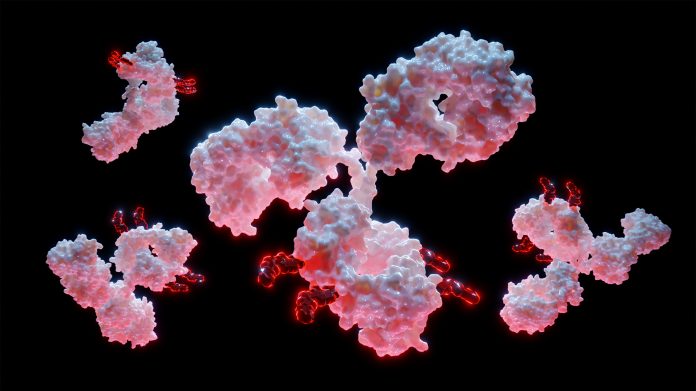
Enlaza Therapeutics yesterday announced a $100 million Series A financing to further develop its proprietary covalent protein technologies and support advancement of its nascent pipeline to the clinic. The company’s aim is to bring covalency to biologic therapies. This approach could be useful in one of today’s most active areas of cancer drug development—antibody drug conjugates (ADCs).
The global market for ADCs is already worth several billion dollars, and is expected to grow considerably over the next decade. There are over 100 of these drugs in clinical trials. Most of the ADCs developed so far are for cancer, but there is potential for using such drugs in other diseases.
ADCs comprise a monoclonal antibody linked to a small molecule drug. One of the drawbacks with ADCs is that the drug payload is sometimes released early, which leads to adverse effects. Drug companies are trying to address this issue with better linkers, but using covalency could be another approach.
“This support will enable continued expansion of our covalent protein drug platform, establishment of a diversified pipeline that demonstrates the broad potential of this approach, and advancement of our lead assets toward clinical development,” said Sergio Duron, PhD, CEO of Enlaza Therapeutics.
The financing was led by the Life Sciences group of J.P. Morgan Asset Management’s Private Capital division, with participation from existing investors: Frazier Life Sciences, Avalon Ventures, Lightspeed Venture Partners, Samsara BioCapital and new investors. It comes two years after Enlaza debuted with a $61 million seed round.
Covalent drugs bind tightly to proteins but until now, they have all been small molecules. Enlaza aims to bring the approach to biologics using its War-Lock technology, which links proprietary amino acids to protein drugs.
“Bringing covalency to the biologics market is an extremely valuable way to unlock the next generation of protein therapeutics that are safer and more tolerable and can be dosed more frequently with lower doses,” said Stephen Squinto, CIO of Life Sciences group of J.P. Morgan Private Capital. “We believe Enlaza’s platform is well positioned for many first-in-class and best-in-class opportunities and are excited to partner with this senior management team.”
War-Lock creates highly specific “warheads” that covalently bind to specific drug targets. The company says this technology enables, “… for the first time, a covalent-acting protein drug that retains the selectivity of small-format biologics.” These drugs are aimed at improving efficacy while reducing toxicities.”
The technology incorporates unnatural amino acids, with expanded chemical function, into protein drugs, allowing covalent bond formation between the drug and its target. These proprietary amino acid subunits, the company says, “can be incorporated into any protein format without impacting the ]therapeutic specificity for the desired targets.”
When un-bound in circulation, War-Locks are latent and unreactive. Only upon specific target engagement is the chemistry activated to form a covalent bond between the drug and the target.
Enlaza has generated further preclinical data for its oncology drug candidates supporting the covalent mechanism of action by demonstrating efficient tumor penetration coupled with rapid systemic clearance, high tumor retention, and low off-target liabilities. Based on these data Enlaza says it has developed a pipeline of covalent protein drugs.
New investors in this financing included Amgen Ventures, Regeneron Ventures, Bregua Corporation, Pappas Capital, and Alexandria Venture Investments. Concurrent with the financing, Stephen Squinto, PhD, chief investment officer (CIO) of the Life Sciences group of J.P. Morgan Private Capital, was named to the board of directors.













